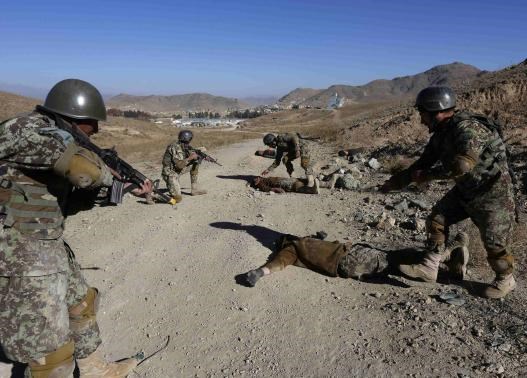Afghan district police chief Ahmadullah Anwari only has enough grenades to hand out three to each checkpoint in an area of Helmand province swarming with Taliban insurgents who launch almost daily attacks on security forces.

"It shames me to say that we don't have enough weapons and equipment. But this is a bitter reality."
As most foreign combat troops prepare to leave Afghanistan by the end of 2014 after 13 years of war, the experiences of Anwari and other police chiefs and army commanders across the country are NATO's biggest worry.
The United States, which provides the bulk of NATO troops in Afghanistan, has poured some $61 billion into training a nascent 350,000-strong security force, seeing it as the lynchpin of a plan to exit its longest war.
U.S. and Afghan commanders have praised the bravery and effectiveness of local soldiers, police and others in the face of a Taliban onslaught that has killed more than 4,600 Afghan security force members already this year.
And, despite increasingly deadly suicide bombings and assaults on military and civilian targets, most of the country is under government control, albeit loosely in some areas.
"The Afghan national security forces are winning, and this is a hugely capable fighting force who have been holding their ground against the enemy," Lt. Gen. Joseph Anderson, second-in-command for coalition forces, told a recent press briefing.
Yet wary of the threat posed by the Taliban as thousands of troops, and most of their sophisticated arms and equipment, head for the exit, Washington appears to be hedging its bets.
President Barack Obama recently freed those few thousand U.S. soldiers remaining post-2014 as part of a 12,000-strong NATO force to engage the Taliban in combat if necessary.
Air support crucial
Incidents in recent days illustrate how Afghan forces will struggle with reduced Western support, particularly from the air, however much they may have progressed.
They also underline how fragile stability remains in Afghanistan, where the West is desperate to prevent the hardline Islamist Taliban movement from returning to power 13 years after it was toppled for protecting al Qaeda.
When insurgents attacked a foreign guest house in central Kabul last Thursday, Afghan commandos killed the attackers, but international helicopters and special forces helped in the mop-up operation that lasted hours.
Taliban fighters also entered Camp Bastion, a large base in the southern Helmand province handed over to Afghan troops a month ago by withdrawing U.S. and British forces. It took Afghan soldiers three days to drive the insurgents out.
Gen. John Campbell, commander of international forces in Afghanistan, said the U.S. would provide limited close air support next year and new aircraft to allow the Afghan Air Force to attack the enemy and evacuate the wounded.
But that takes time. It will be at least three or four years before a home-grown air force can replace U.S. planes and helicopters, said Maj. Gen. John McMullen, the U.S. officer in charge of developing Afghan air capabilities.
The prospect of less frequent intervention by fighter jets and attack helicopters across the country's often hostile terrain is a daunting one.
"If we had air support, we could very easily defeat the Taliban and we would not face a big number of fatalities," said Mohebullah, police chief of Baraki Barak district in the eastern province of Logar.
In August, hundreds of Taliban mounted one of its most brazen attacks in recent years in Logar, just south of Kabul.
Mohebullah, who goes by one name, said his men were fighting bravely but complained of being outgunned. Officers are armed with AK-47 rifles and a few rocket-propelled grenade launchers, but he said insurgents had mortars and machine guns.
Civilian casualties keep rising
Aside from air support and weapons, intelligence gathering is still dependent on U.S. systems. Keeping supply chains running for everything from ammunition to spare parts for vehicles is another recurring problem.
Civilian casualties are climbing, meanwhile, with more than 1,500 people killed in the first six months of 2014, 17 percent higher than in the first half of 2013 and on track to make this year the deadliest of the war, according to the UN.
Nearly 3,500 foreign soldiers have died since 2001, including around 2,200 Americans.
The U.S.-led coalition says insurgent attacks have fallen this year, although the number of 18,000 given by Anderson still amounts to more than 50 a day.
And while the coalition says Afghan forces control most of the country, the reality on the ground can be very different.
Graeme Smith, senior Kabul analyst for the International Crisis Group, says that in many remote districts, the government controls a few administrative buildings "but the influence of Afghan forces may not extend far beyond that point".


























